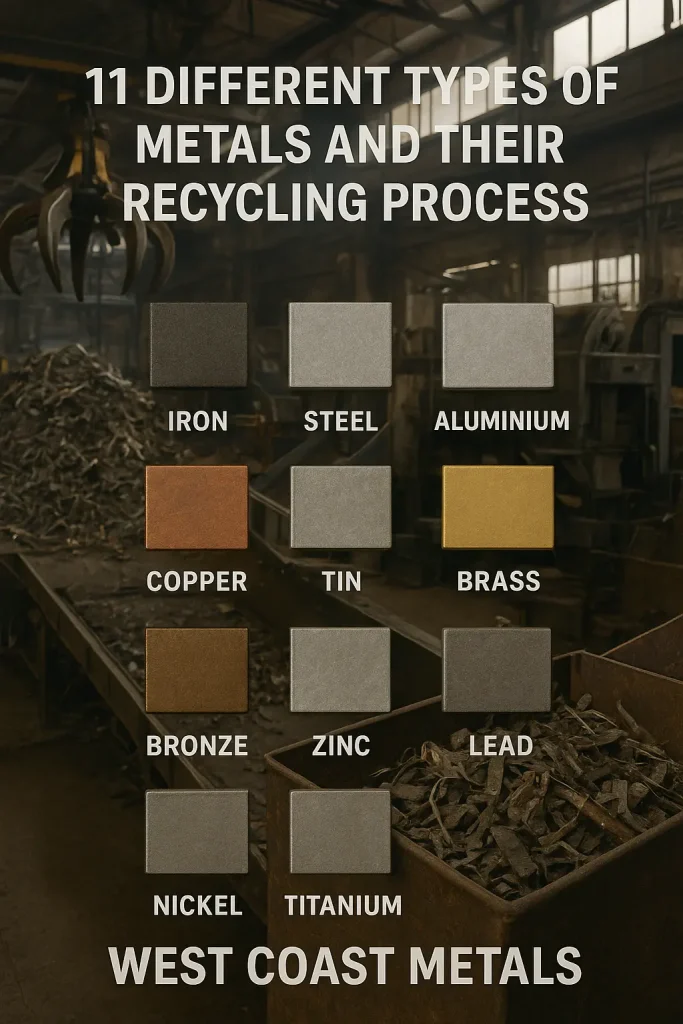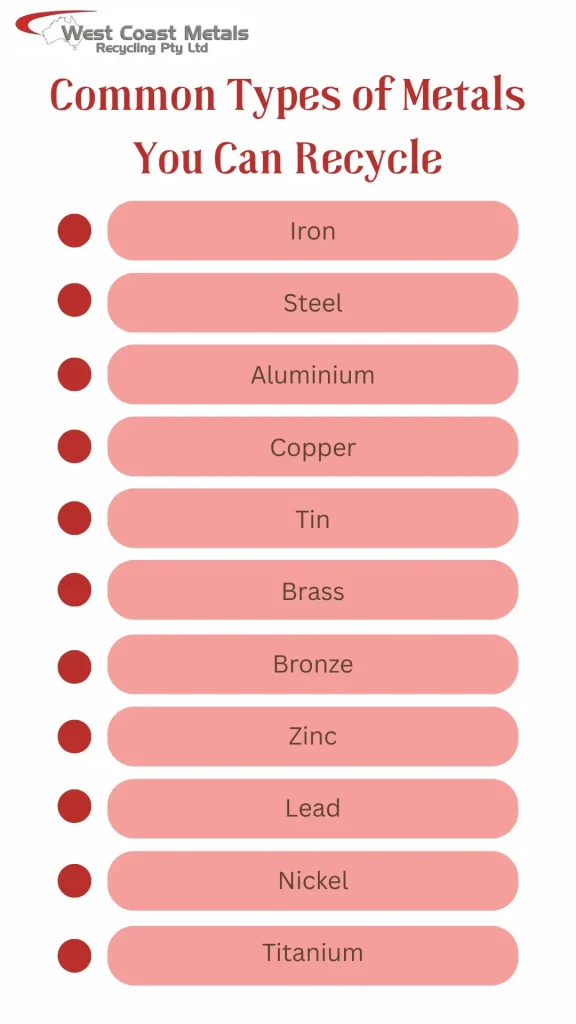11 Different Types of Metals and Their Recycling Process: West Coast Metals

Want to get rid of that rusty gate, old fridge, or heap of wiring in your garage?
They all seem useless to you. But in reality, they consist of different metals that are far more useful than you think. Rather than letting them sit collecting dust or heading to landfill, you can go for recycling metals and give them a new life.
This process can put money in your pocket & benefit the planet too. Win-win, right?
But first, you need to understand the kinds of metal there are to recycle. So, you can sort out valuables, get the perfect deal & help the environment in best way possible.
At West Coast Metals, we’re a family-owned, female-run recycling business in Perth with over 20 years’ experience. We buy all the types of metal and offer you the best price. Our goal? Helping you turn your scrap into cash, fast and friendly.
Let our experience guide you about recycling different types of metals.
Understanding Different Kinds of Metal: Ferrous vs. Non-Ferrous
When you hear about types of metallic scrap, two big groupings will be there. Understanding them is the first step that’ll make everything else easier for you.
Ferrous Metals
These are metals that contain iron (the Latin ferrum) and tend to be magnetic. They’re strong and common in construction, but are prone to rust unless treated. Because they’re magnetic, sorting them is simpler and a magnet can easily separate other materials from metals.
Examples include steel, cast iron and wrought iron.
Non-ferrous metals
Non-ferrous metals don’t contain iron. They’re usually non-magnetic, more corrosion-resistant, lighter and more valuable per kilo. These metals retain their properties after recycling, and that’s why are more suitable for reuse.
E.g. aluminium, copper, lead, zinc, tin, nickel etc.
The value of non-ferrous metals is often higher, which means more cash for you.
Common Types of Metals That Can Be Recycled
In Australia, about 5.7 million tonnes of unprocessed scrap metal (ferrous + non-ferrous) get generated annually. It all falls into one of the following metal types. Let’s discuss them all with their sources, value and how we at West Coast Metals recycle them.
✓ Iron
Sources: old machinery frames, radiators, heavy cast parts, old fences.
Value & Potential: Iron tends to have lower value compared to non-ferrous. But because it’s abundant it still contributes significantly to recycling volumes. According to national data, ferrous scrap (which includes iron) dominates metal recycling.
Recycling Process:
- Collection and sorting (magnetic separation helps identify iron-rich materials).
- Shredding or heavy reduction to manageable size.
- Melting in a furnace (blast furnace or electric arc furnace) and recasting into new iron-based products.
We accept clean iron scrap (free of excessive contaminants) and offer cash for it. Sorting it properly will help us pay you better.
✓ Steel
Sources: old cars, household appliances (washing machines, fridges), building materials like beams, pipes.
Value & Potential: Steel is one of the most recyclable metals globally, and in Australia it makes up about 86 % of recycled metal by weight.
Recycling Process:
- Magnetic separation to extract steel.
- Shredding or cutting into manageable pieces.
- Melting via electric arc furnace (EAF) or basic oxygen furnace (if mixed with other iron feedstock).
- Purification and casting into new steel products.
We take both carbon steel and stainless steel (though stainless has added value and special treatment). Clean and sorted steel can speed up processing and improve your return.
✓ Aluminium
Sources: beverage cans, window frames, aluminium siding, car/truck parts, bicycle frames.
Value & Potential: Although it makes up a smaller share by weight, aluminium is very energy-efficient to recycle. Recycling it saves about 95 % of the energy needed as compared to producing it from bauxite.
Recycling Process:
- Collection and sorting (aluminium is non-magnetic).
- Removal of coatings, paints and non-metal attachments.
- Melting at lower temperatures than ferrous metals and casting into ingots.
Because aluminium doesn’t corrode like iron and is lighter, we encourage you to separate it where possible. It can give you a better rate if it is clean and free of contamination.
✓ Copper
Sources: electrical wiring, plumbing pipes, air-conditioning units, power cables.
Value & Potential: Copper is one of the most valuable common scrap metals. Its conductivity and demand in electrical infrastructure mean that even small quantities matter.
Recycling Process:
- Stripping insulation (for wires) and cleaning.
- Melting and refining to remove impurities.
- High-grade copper can be recycled into the same applications as virgin copper.
Because copper is high value, we have stricter ID requirements (drivers licence + recent utility bill) for selling. Clean and sorted copper means higher payout.
✓ Tin
Sources: coatings on steel food cans, solder, some electronics, and tin-based alloys.
Value & Potential: Individually tin isn’t as high in volume as steel or aluminium, but still important in alloys and electronics.
Recycling Process:
- Extraction from mixed materials (after electronics or coating removal).
- Electro-refining or melting and purification.
If you bring tin or tin-coated scrap, we’ll look at quantity and purity to provide a fair rate. Remember every little bit helps in the bigger recycling goals.
✓ Brass (Copper-Zinc Alloy)
Sources: door handles, plumbing fittings, decorative trims, musical instruments, old fixtures.
Value & Potential: Brass has a potential to get good rates because it’s non-ferrous and composed of valuable metals.
Recycling Process:
- Sorting and separation from other materials (remove non-metal parts).
- Melting and refining to separate copper and zinc, or casting as brass alloy for reuse.
Clean brass separated from mixed scrap will give you the best return. We recommend removing large non-metal attachments.
✓ Bronze (Copper-Tin Alloy)
Sources: statues, bearings, boat fittings, marine hardware.
Value & Potential: Bronze is less common in everyday scrap but more important in industrial and decorative applications.
Recycling Process:
- Similar to brass: melting, separating alloys, recasting.
- Its corrosion resistance is preserved in recycling.
If you have bronze items it’s worth bringing them in separately. We’ll assess purity and give you a competitive rate.
✓ Zinc
Sources: galvanised steel coatings, die-cast parts, roofing sheets, some batteries.
Value & Potential: Zinc has moderate value. However, its recycling helps protect steel (by re-coating) and conserves resources.
Recycling Process:
- Removal of coatings or separation of zinc from mixed materials.
- Melting and casting into new zinc ingots or alloys.
Zinc scrap is always a part of larger mixed loads. Separating it can help boost the value of your load.
✓ Lead
Sources: car batteries, old pipes, cable sheathing, some roofing materials.
Value & Potential: Lead is heavy, and recycled lead helps prevent toxic materials entering landfill. Because of its toxicity, recycling requires safe handling.
Recycling Process:
- Collection and safe separation (old batteries have acid and other hazards).
- Smelting and refining to remove contaminants.
We follow safe practices and regulatory standards. Make sure that any lead scrap is safe to handle or bring to us for guidance.
✓ Nickel
Sources: stainless steel alloys, batteries (especially newer ones), turbines, coins.
Value & Potential: Nickel is gaining importance due to its role in green technologies (e-mobility, stainless steel). Its recyclability is high and demand is increasing.
Recycling Process:
- Sorting of nickel-rich alloys.
- Smelting/refining to extract nickel for reuse in new alloys, batteries and speciality uses.
If you have nickel alloys from industrial sources or older equipment, bring them in. We’ll evaluate purity and quantity.
✓ Titanium
Sources: aircraft parts, medical implants, specialist bike frames, high-end equipment.
Value & Potential: Titanium is expensive and lighter but stronger than many metals. It is not a part of everyday scrap, but have more recycling potential in high‐tech sectors.
Recycling Process:
- Requires high-purity melting under vacuum or inert atmosphere to maintain material properties.
- Recasting into high performance products.
We don’t always see titanium in domestic loads but from industrial clients, it’s worth evaluating. Contact us if you think you have a titanium scrap load.

Got old piping, wiring, machinery, or just scrap waiting to go?
Choose West Coast Metals: Local Experts in Perth
At West Coast Metals we know how safe & efficient recycling of metals is done.
We’re contributing to a waste-free Perth since 2003. As a family-based and female-run business, we pride ourselves on being a step above in service. Just drop off your scrap to us or arrange pickup. We’ll sort it, weigh it, and pay you in cash or bank transfer.
Let’s turn your scrap into cash and keep Perth’s metal in motion.

